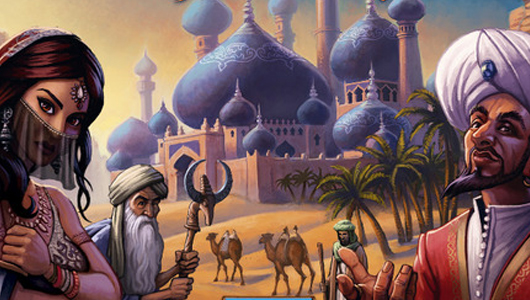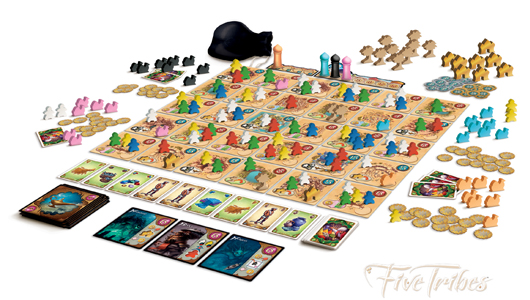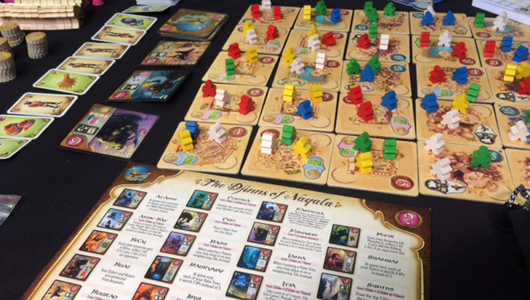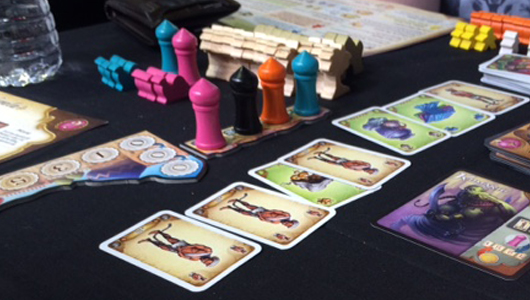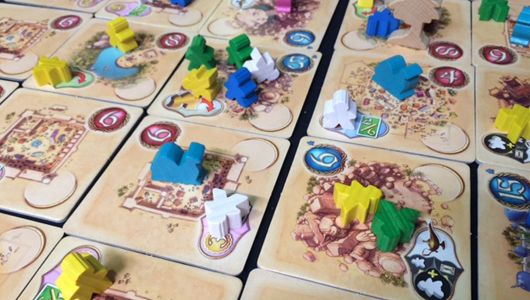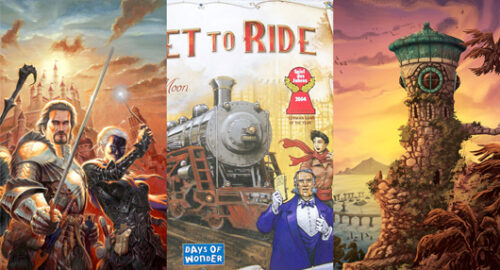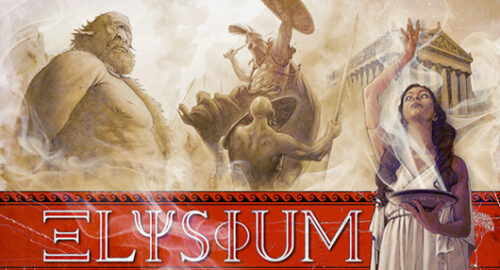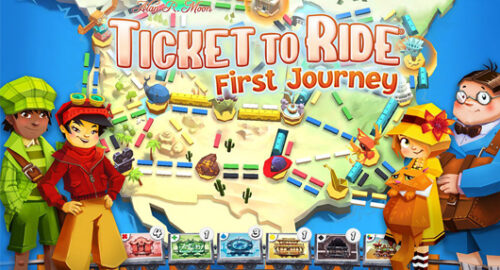Worker placement board games have been among my favourite types of board games for a while. It is such a simple concept that works amazingly well – commit your meeple (or a marker or a token) to a space on the board and you will get an action or a resource in return. From classic Carcassone to more strategic and complex games, such as Lords of Waterdeep or Russian Railroads, worker placement games cater to all types of audiences of various board gaming experiences. When I heard about Five Tribes, a worker displacement game, my interest was piqued straight away.
• Designer: Bruno Cathala, Clement Masson
• Publisher: Days of Wonder
• Number of Players: 2-4
• Playing Time: 60 min
Worker displacement was a concept completely novel to me. In theory it is easy to understand as it is simply the inverse of worker placement game. The resources and abilities are unlocked when your ‘workers’ are removed, rather than placed. However, Five Tribes has a variety of added abilities and benefits that are not so easy to grasp at first. The board is made up of a 5 by 6 randomised square tiles. On each of those tiles 3 meeples are placed at the start of the game, again randomly. Displacement works as follows: a player chooses a tile and picks up all meeples from it. He/she then drops one meeple on another tile, adjacent to the starting tile, in the orthogonal direction, and so on until he/she runs out of meeples. However, in order to make the move legal the last meeple can only be dropped on the tile which has at least one meeple of the same colour (there are five different colours of meeples, hence the name Five Tribes). Your last meeple, along with all meeples of the same colour on the last tile are removed from the game and returned to a meeple bag, which is very usefully included in the game box. Depending on the colour of the meeples that were removed, a certain ability will be unlocked. Additionally, the last tile also grants the player an ability to acquire some resources or buy Djins (basically, acquire special powers), and if there are no meeples left on the tile, the player becomes the owner of that tile. There are a lot of things going on here!
However, moving meeples is not the only game mechanic that the player needs to keep in mind. There is also betting for a turn order. At first this seems like an out of place mechanic but its significance is quickly discovered. The frustrating and at the same time wonderful part of Five Tribes, is a constant search for the best meeple displacement combination. The more meeples are taken off the board during the turn, the greater the benefits are. Also some tile benefits are better for the player at that certain stage than others. For example, if player collects resource cards, he/she would want to land on the market tile where resources could be purchased. Each tiles has a different value of victory points and, of course, owning as many tiles as possible is a contributing factor to the victory. Again, there are several factors to consider even before beginning to bet! So maybe there is one great move on the board that no one else has spotted yet, then the player would want to bid high to get the first turn before someone else sees the move or unknowingly messes it up. Or, alternatively, there aren’t any great moves, then the player might want to see how other players will change the board by moving meeples. Or maybe, the player simply has no excess money to bid on the turn order and has to be content with the place that was left empty.
As it is probably obvious from the two chucky paragraphs above, Five Tribes has a lot of rules and nuances in its gameplay. At first it is overwhelming. During the first 10 minutes of my first game I thought my brain was going to explode. However, somehow 5 minutes after that I was so into the game and having so much fun, that my initial experience did not matter. My fellow players would tease me with seeing a great combination that was not apparent to me, and two minutes later I would be doing the same back to them. Then somebody would make a master move that nobody predicted, claiming a lot of points, and we would all sit back in awe, admiring the cleverness of the move. It was like making a set of incredibly strategic and successful moves in chess, without your opponent realising, only easier and about a hundred times more fun.
The game ends when there are no meeples left on the board or when no legal moves can be made. Calculating victory points is an ordeal in itself. Almost every single piece in the game – meeples, cards, money tokens – can provide victory points. Luckily there is a little notepad, similar to the one in 7 Wonders, which can be used to calculate the final scores. However, despite seemingly a variety of ways to acquire victory points, resource cards always provide the higher number of victory points than anything else. In my first game, I won by a mile simply because I was the only one collecting them. Their value is camouflaged as they seem to be the most boring outcome in the game – all you need to do is just to collect different sets of them – where as Djins, for example, with their special powers seem much more attractive and rare. However, if there is no one else contesting for the resource cards, winning the game becomes almost too easy.
Having said that, for me, when playing Five Tribes, winning is almost irrelevant. Yes, coming first in the game is always a pleasant bonus. However, in this game it is incomparable with satisfaction that you get from one particularly clever and lucrative meeple displacement.
I would also suggest taking some time reading through all available Djin cards, their description can be found in the rule book. Although only three Djins are available for the purchase per round, it is good to know all possible powers as they are very specific and so cater for different strategies. Although, some of them can seem overpowered compared to the others, it is a combination of Djin card and meeple powers that produce the best result in the end.
Five Tribes box proudly states that the game can be completed in 60 minutes. Maybe, that is true when played by top MIT students, however for the rest of us it would take at least 90 minutes from start to finish. The game does benefit from players taking some time to contemplate the board, rather than just making the first move they can think of. I am not implying that the game is hard, but it is definitely busy with options and choices that take time to consider.
All meeple fans will be very happy with Five Tribes. Not only does it have a lot of those cute wooden pieces, but they also come in variety of shapes from traditional roughly people shaped meeples to castle and camel meeples. Those pink camels! They are cute and you know it! However, be careful not to lose any of them, especially the traditional meeples, as loosing even one of them will make it impossible to play the game.
My final suggestion is to find a well-lit spot to play the game. This was foolishly not considered when we sat to play the game on a dimply lit table. As the result the white and yellow meeples were almost indistinguishable, which, of course, did not help the progress of the game, especially since their powers vary significantly.
Five Tribes is challenging and fun throughout. When played for the first time the rules might feel overwhelming, however after a couple of rounds the combinations of palaces, camels, Djins, assassins and many other things begin to make sense. The abundance of different game elements is one of the reasons why I would suggest to play the game at least twice before forming a concrete opinion as possible strategies and advantages of certain cards are not immediately obvious on the first playthrough. Five Tribes is a great competitive brain scratcher, and so far I have enjoyed every game I have played. However, I do warn everyone who is playing the game for the first time to collect resource cards. Without this warning, winning the game almost feels like robbing people of their victory.
